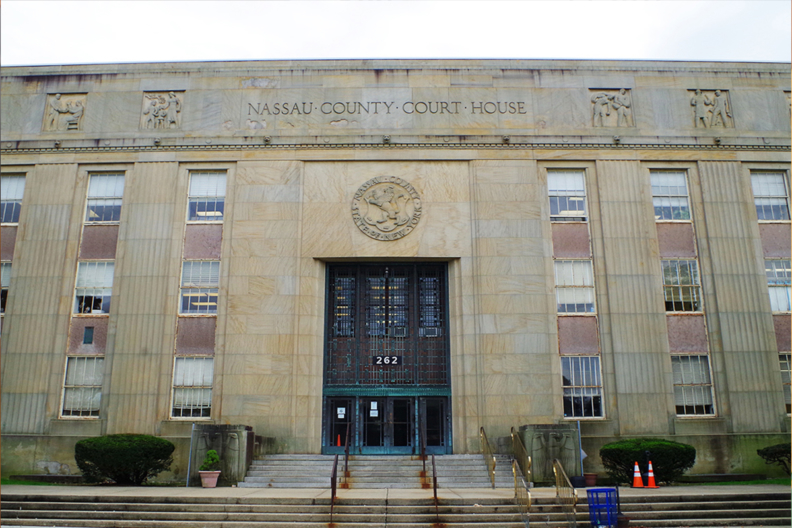Nassau Needs Real Transparency, Not Bail Reform Scare Tactics
There are plenty of ways Nassau County could be more transparent if that's truly what its leaders want.

Nassau County Executive Bruce Blakeman touted a new executive order earlier this month requiring daily reports on the bail status of people arrested by county police. The reports will show incidents in which people who are released pending trial are then re-arrested in a likely attempt to use selective data releases to further his political agenda.
Blakeman wants the state legislature to overturn the bail reform legislation lawmakers passed in 2019 that eliminates money bail for most misdemeanors and nonviolent felonies. He likely wants to seize on incidents in which people who are released while their case is pending are then re-arrested. The executive order is clearly a part of Blakeman’s efforts to reverse progress on bail, but he couched it in much nobler terms, saying the order “sheds sunlight” on the 2019 law.
The order appears to call for the release of raw arrest data without context, or without providing the percentage of people who are released and then rearrested. We know that only a minuscule percentage of people released on bail are then rearrested and accused of serious crimes. It’s also not clear whether the Department will reveal what someone has been rearrested for.
It seems highly likely, given Blakeman’s desire to agitate against bail reforms, that this executive order will be used as a tool to release selective details that fit his narrative and further his reactionary agenda.
We all want safe communities – and Nassau remains one of the safest places in the country – but we need proven solutions like restorative justice and violence interruption programs that can help stop crimes from happening in the first place. We should also provide wraparound services and youth programming that ultimately stop cycles of poverty and re-incarceration. And we need to fully invest in our communities across the state that lack affordable housing, adequate mental health care, and fully funded schools.
There is no evidence, based on state data, that bail reform leads to an increase in crime, so there’s no good reason to think repealing the law will improve public safety.
We all want safe communities – and Nassau remains one of the safest places in the country – but we need proven solutions like restorative justice and violence interruption programs that can help stop crimes from happening in the first place.
What we don’t need is to go back to the pre-2019 reality when a person’s freedom was far more dependent on how much money they had.
Almost everyone who is incarcerated is released from jail or prison at some point. Taking a person out of their community for longer periods of time does not help them reintegrate. In fact, it can do the opposite.
There is no evidence, based on state data, that bail reform leads to an increase in crime, so there’s no good reason to think repealing the law will improve public safety. But there is ample evidence that bail reform is working. The law has allowed tens of thousands of people to hold on to their jobs, maintain connections with their family and communities, and avoid the high risk of catching COVID in jail. The pandemic has made already dangerous carceral settings even more deadly, and bail reform likely helped save the lives of people who live and work in jails. The reforms have also allowed countless people to keep their placement in treatment programs.
Given all of the controversy around the reforms, it’s easy to forget that the purpose of bail is to make sure people return to court. Under the new law, people are showing up to their court dates at high rates.
As for Blakeman’s desire for transparency, the Nassau County Executive has plenty of ways to shine more sunlight on what the county is up to. In October, the NYCLU had to sue the Nassau Police Department after it refused to turn over the vast majority of police disciplinary, use-of-force, and field stop records that are legally required to be released.
In the wake of nationwide protests for police accountability, the State Legislature repealed section 50-a of New York’s civil rights law that had been used to shield nearly all police disciplinary records. But even with 50-a gone, Nassau refuses to turn over a huge trove of these records.
And last year, County leaders rebuffed calls by police reform groups to require more reporting on police stops and arrests, and to allow independent oversight of the civilian complaint review process. These reforms would give the public a clearer picture of both police misconduct and who is being arrested and why.
Releasing police disciplinary records and increasing reporting on police activity would represent real steps towards transparency and accountability in Nassau County. These are the types of moves that politicians truly interested in bringing sunlight to the government could and should make.
If however, Blakeman is using calls for transparency to push a political agenda – based on fearmongering and misleading information around bail reform – the people of Nassau County shouldn’t fall for the ruse.
